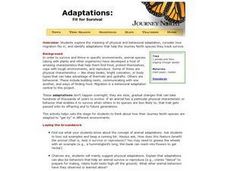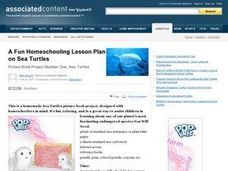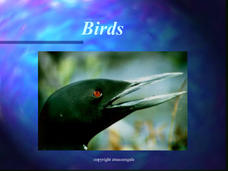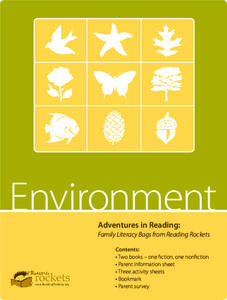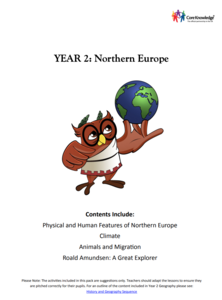Advocates for Human Rights
Nativism and Myths about Immigrants
Where do anti-immigrants myths come from, and how can they be refuted? Learners critically analyze media reports and how to identify reliable sources. After studying a timeline that details the history of US nativism, groups research the...
Curated OER
Sudan Surprise
Young scholars consider animal migration patterns that have been recently documented in Sudan. They investigate the migratory patterns of animals and discuss how human conflicts and activities affect migratory wildlife populations.
Curated OER
Animal Adaption to Environment
Students explore the concept of adaptation as a means of surviving in varied environments. They discuss human adaptations and then view slideshows and video that present animal adaptations in the following environments: cold regions,...
Curated OER
Can't Wait - Gotta Migrate:The Monarch Butterfly
Students study the migratory behavior of the monarch butterfly and to carefully develop a scientific method for answering one question concerning their behavior. They perform many meaningful tasks which help them explain the Monarch...
Lee & Low Books
First Come the Zebra Teacher’s Guide
Accompany a reading of First Come the Zebra written and illustrated by Lynne Barasch with a teacher's guide equipped with before reading, vocabulary, and after reading activities. Additional social studies, science, music, art, math, and...
Curated OER
Week 7: Animal Adaptations - Bird Beaks
Learners use tools to represent bird beaks and pick up different types of food with them in order to discover which beak would help the bird survive depending on their food type.
Curated OER
Hickory Dickory Dock: The Biological Clock
Students investigate the effect of day length on animal migrations. They view a Powerpoint presentation, identify their own personal migrations and cues, answer discussion questions, and test a hypothesis about seasons.
Curated OER
Seeing and Hearing Game
Learners study the animal senses. In this animal senses lesson, students act out animal movements and make animal sounds. They use "see and hear" cards to play a game in which they find another child with a either "make a sound or...
Curated OER
Adaptations: Fit For Survival
Middle schoolers track species using the Journey North project. They examine the meaning of physical and behavioral adaptation, migration, and identify adaptations that help the species they track survive.
Curated OER
How Animals Prepare for Winter
Second graders study which animal hibernate and which migrate. They observe the weather conditions related to each and complete the associated worksheets and web activity.
Curated OER
Hula Hoop Habitats
Students explore migration. In this science activity, students play a game in which they explore bird migration. Students discuss the needs of birds and play a game in which they "migrate" in order to meet their needs.
Curated OER
Behavior Adaptations
In this behavior worksheet, students review different types of behavioral adaptations including migration, hibernation, and communication. This worksheet has 10 matching and 10 true or false questions.
Curated OER
Animal Adaptations
students in groups to work on bulletin board, making a list of animal adaptations. They write an example of each body covering and find pictures of animals with these coverings. They mount pictures and label the covering. They should be...
Curated OER
Homeschooling Lesson: Sea Turtles
Students write down the names of common turtles and observe pictures of various types. In this sea turtles activity, students review names and features of these animals, label and draw a picture. Students research habitat, migration,...
Biology Junction
Birds
Birds adapted to almost every climate on the planet, from the Arctic to the rain forests. A presentation focused on birds covers their similarities and differences. It starts with their evolution from reptiles, their many physical...
PBS
Bird is the Word
Tracking area birds can tell a lot about an ecosystem. Learners use that understanding as motivation to observe and record bird populations in their area. They use journaling to store their information and ultimately choose one bird as...
PBS
Reading Adventure Pack: Environment
A fiction and nonfiction text, The Great Kapok Tree: A Tale of the Amazon Rain Forest by Lynne Cherry and I See a Kookaburra! Discovering Animal Habitats Around the World by Steve Jenkins and Robin Page begins a learning experience in...
PBS
Reading Adventure Pack: Sleep
A reading adventure pack features two stories—Time to Sleep by Denise Fleming and Animals Don’t Wear Pajamas by Eve Feldman. In response to reading the fiction and nonfiction texts, scholars create a dreamcatcher, discuss hibernation,...
WindWise Education
What is Wind Power's Risk to Birds?
How is risk determined? Through the use of a reading passage, individuals or groups learn about bird interactions with man made structures along with wind turbines. Pupils use information from the second reading passage to conduct an...
Chicago Botanic Garden
Seasons of a Plant
The third in a series of six lessons is an engaging three-part activity defines that discusses phenology, focusing on the cyclic seasons of plants. Pupils then observe phenology outside before determining how climate change can...
CK-12 Foundation
Coriolis Effect: Flying... South?
It turns out there's a lot more to heading south for the winter for migratory birds! Study the Coriolis Effect with a fun, hands-on teaching tool. Pupils take to the skies as a small red bird bound for the tropics from his frosty home at...
Core Knowledge Foundation
Year 2: Northern Europe
How is life in Northern Europe different from other areas of the world? Historians journey through the various regions of Northern Europe discovering what type of climate, animals, and lifestyles exist in that section of the world. They...
Curated OER
Spatial Characterization of Animal Movement
Students identify biotic and abiotic factors which may alter the observed patterns in plant communities with different structural characteristics, climate, or environmental constraints.










